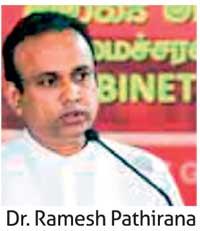21 Oct 2021 - {{hitsCtrl.values.hits}}
Alarmed by a quality drop in green tea leaves, the government assured that the measures are in place to supply nitrogenous fertiliser for the tea sector, via imports without disruptions, as planters struggle to source organic fertilisers amid the import ban on chemical fertilisers.
 Accordingly, Cabinet Co-Spokesperson and Plantation Minister Dr. Ramesh Pathirana addressing the weekly Cabinet press briefing this week revealed that the government has decided to import sulphate of ammonia as the source of nitrogenous fertiliser for tea plantations. The imported stocks of nitrogenous fertiliser stocks are to be distributed to tea estates via tea factories and the Sri Lanka Tea Board (SLTB) has been made responsible to oversee
Accordingly, Cabinet Co-Spokesperson and Plantation Minister Dr. Ramesh Pathirana addressing the weekly Cabinet press briefing this week revealed that the government has decided to import sulphate of ammonia as the source of nitrogenous fertiliser for tea plantations. The imported stocks of nitrogenous fertiliser stocks are to be distributed to tea estates via tea factories and the Sri Lanka Tea Board (SLTB) has been made responsible to oversee
this operation.
Nitrogen fertiliser is critical for growth as well as quality of tea. According to the Tea Research Institute (TRI), the main source of nitrogenous fertiliser for tea plantations in Sri Lanka is sulphate of ammonia, which has around 26 percent nitrogen content.
Dr. Pathirana noted that both quality and quantity drops were recorded at tea factory levels this month, while the drop in quantity was minimal, due to the prevailing favourable climatic conditions. The Planters’ Association of Ceylon (PA), representing the Regional Plantation Companies (RPCs), this week called for the fertiliser distribution to be fast-tracked, in order for the tea sector to immediately recommence fertiliser application.
The minister was confident that the current fertiliser crisis in the tea industry to be resolved within a month and the tea production to return to normalcy. Further, he assured that chemical fertiliser import to be continued until the organic fertiliser supply becomes sufficient to cater to planters’ requirement. Meanwhile, Cabinet Co-Spokesperson and Mass Media Minister Dullas Alahapperuma stressed that the government wouldn’t hesitate to prioritise the needs of farmers, even though it could mean taking a step back, in terms of rolling out government policies.
He noted that the government is also considering solutions to farmers’ grievances on the shortage of weedicides.
Tea remains Sri Lanka’s largest agriculture export, generating around US $ 1.3-1.5 billion in export revenue per annum, while the import cost on fertilisers for the tea sector amounts to only US $ 30 million.
17 Nov 2024 3 hours ago
17 Nov 2024 5 hours ago
17 Nov 2024 7 hours ago
17 Nov 2024 7 hours ago
17 Nov 2024 8 hours ago